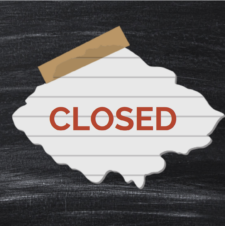Be Prepared: It’s More Than a Boy Scout Motto by Family Travel on a Budget

 A few years ago, my siblings and I sent our parents on vacation to a relaxing resort on the South Carolina coast, a foodie paradise. We booked the trip for early spring, before the hot, sticky humidity dampened everything. For my parents, who love dining out and visiting historic places like old southern plantations but aren’t so keen on swimming pools and water slides, this should have been the perfect trip.
A few years ago, my siblings and I sent our parents on vacation to a relaxing resort on the South Carolina coast, a foodie paradise. We booked the trip for early spring, before the hot, sticky humidity dampened everything. For my parents, who love dining out and visiting historic places like old southern plantations but aren’t so keen on swimming pools and water slides, this should have been the perfect trip.
Then, the unthinkable happened.
In the early morning hours, my dad suffered a horrific attack. Five hours away, at home, I awoke that morning to a horrifying message on our answering machine, “Hi. This is mom. We think Daddy had a stroke this morning. I’m not sure he’s going to make it.” I’d never heard my mom’s voice so shaky. Within an hour, I was on the road, a bag of clothes tossed on the back seat.
When I arrived at the hospital, the doctors had determined that my dad did not have a stroke, but for some reason had suffered a severe grand mal seizure, violent enough to shatter his shoulder. I got there as they prepped him for surgery. He spent the next several days in the hospital, recovering from two surgeries, not quite the vacation they had anticipated.
My mom and dad were quite fortunate. Though they had never experienced anything like this before, my mom instinctively made the right choices. Even before leaving home, they had done everything “right.” They were prepared!
We don’t expect injuries, illness or other catastrophes on vacation, but they happen. I experienced my first allergic reaction to shellfish on vacation. I broke my toe, shattered into three pieces, while on vacation. It happens. A few minutes of preparation before the trip can make all the difference.
Preparing Medications for Travel
- Pack more than enough of your daily prescription and over the counter medications (include enough for extra days in case you are stranded by illness like my parents or bad weather that closes airports and roads).
- Include the medicine bottles that contain important dosing information and proper spelling of medications or request a printout from your doctor’s office a couple weeks in advance of the trip if you plan to use a pill dispenser. Be sure to carry that information with you for easy access. We carry our medications and over the counter meds in a ziplock bag and store everything in the bag in case we need to grab and go.
- Consider a medic alert bracelet for anyone who suffers from a serious condition: diabetes, dementia, autism, allergies so that emergency personnel can respond appropriately.
- Provide a copy of your medical information to a trusted friend or family member. Write “Emergency Contact: name/number” on a piece of paper and tuck it in your wallet.
- If traveling internationally, register travel plans with the U.S. Department of State so they can provide more efficient emergency assistance.
- If you forget something and are traveling within the United States, call your doctor’s office and request an emergency prescription. Provide the local pharmacy phone number. Prescriptions for controlled substances cannot be called in.
Responding Effectively and Efficiently in an Emergency
My mom handled my dad’s seizure perfectly, even though at that moment she thought he was dying. (Go, Mom!) If you have an emergency at the hotel, follow these steps:
- Call 9-1-1. Remember to DIAL 9 to get an outside line, so call 9-9-1-1.
- Tell the operator your emergency, the specific name of your hotel (there might be five hotels from the same chain nearby, so say “Hilton Garden Inn Historic District” and your room number or location.
- Call the front desk to inform them of your emergency. If you call and they say, “Please hold” as they click you to hold, hang up, call back and state forcefully, “Emergency!” They’ll listen.
- Remember to take all medicine bottles or your prescription list, your insurance card and emergency contact numbers with you to the hospital.
- Ask for pen and paper if you don’t have some with you. As you receive information, ask for specifics: diagnosis, treatment plan, treating physician contact information and write it down. In an emergency situation, especially away from home, it can be difficult to keep the details straight.
Once my dad stabilized and we had a sense of what to expect, we contacted the resort with more information and asked for an extension on our stay since my dad would be hospitalized far beyond the end of their scheduled trip. Fortunately, it was not peak season and the resort moved my mom and me to a suite, offering more space to relax and discounted the rate on the room from $300/night to $50/night. Had the hotel been at full capacity, we would have asked their assistance finding someplace else to stay.
Additionally, ask for extensions on rental car contracts and a flight change for air travel. They want your repeat business and have policies in place for emergencies, though you may incur a change fee.
Finally, if you booked your trip through a travel agency or purchased travel insurance, contact them for assistance. Their job is to help you through your emergency!
While no one dreams of health emergencies during travel, they do happen. Being prepared in advance will help you navigate the crisis more easily.
About Karen: Karen and her family have learned the art of enjoying the travel experience. She shares humorous anecdotes from her own experiences and uses them to equip the reader to travel better. Her blog offers: Step-by-step “how to’s” for each element of the vacation planning process, practical advice on how to evaluate options in light of your family’s needs, wish-lists, and finances, and destination-specific planning aids. You can follow Karen’s travel advice on Facebook & Twitter.
[tfg_social_share]





